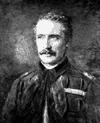- Gordon, Charles George
-
born Jan. 28, 1833, Woolwich, near London, Eng.died Jan. 26, 1885, Khartoum, SudanBritish general.Gordon distinguished himself as a young officer in the Crimean War (1853–56) and subsequently volunteered for the second Opium War (1856–60). In 1862 he helped defend Shanghai during the Taiping Rebellion. These exploits earned him the epithet "Chinese" Gordon. In 1873 the Egyptian ruler Ismāīl Pasha, who regularly employed Europeans, appointed Gordon governor of the province of Equatoria in southern Sudan (1874–76) and as governor-general of the Sudan (1874–80). In that post Gordon acted to crush rebellions and suppress the slave trade. He was again sent to the Sudan by Britain in 1884 to evacuate Anglo-Egyptian forces from Khartoum, which was threatened by Mahdist movement insurgents. After his arrival the city was besieged; it remained isolated for several months until it finally succumbed (Jan. 26, 1885). Gordon was killed in the action.
 Charles George Gordon, portrait by Lady Julia Abercromby; in the National Portrait Gallery, London.Courtesy of The National Portrait Gallery, London
Charles George Gordon, portrait by Lady Julia Abercromby; in the National Portrait Gallery, London.Courtesy of The National Portrait Gallery, London* * *
▪ British generalbyname Chinese Gordonborn Jan. 28, 1833, Woolwich, near London, Eng.died Jan. 26, 1885, Khartoum, SudanBritish general who became a national hero for his exploits in China and his ill-fated defense of Khartoum against the Mahdists (Mahdist).Gordon, the son of an artillery officer, was commissioned a second lieutenant in the Royal Engineers in 1852. During the Crimean War (1853–56) he distinguished himself by his reckless bravery in the siege trenches outside Sevastopol. He was promoted to captain in 1859 and volunteered the following year to join the British forces that were fighting the Chinese in the “Arrow” War. He was present at the occupation of Beijing (October 1860) and personally directed the burning of the Chinese emperor's summer palace. In May 1862 Gordon's corps of engineers was assigned to strengthen the bulwarks of the European trading centre of Shanghai, which was threatened by the insurgents of the Taiping Rebellion. A year later he became commander of the 3,500-man peasant force, known as the “Ever-Victorious Army,” raised to defend the city. During the next 18 months Gordon's troops played an important, though not a crucial, role in suppressing the Taiping uprising. He returned in January 1865 to England, where an enthusiastic public had already dubbed him “Chinese Gordon.” For the next five years he was commander of the Royal Engineers at Gravesend, Kent; he spent his spare time developing his own unorthodox, mystical brand of Christianity and engaging in philanthropic activity among poor youths.In 1873 the khedive Ismāʿīl Pasha of Egypt, who regularly employed Europeans, appointed Gordon governor of the province of Equatoria in the Sudan. In Equatoria, from April 1874 to December 1876, Gordon mapped the upper Nile River and established a line of stations along the river as far south as present-day Uganda. After a brief stay in England, he resumed service under the khedive as governor-general of the Sudan. Gordon established his ascendancy over this vast area, crushing rebellions and suppressing the slave trade. Ill health forced him to resign and return to England in 1880; over the next two years he served in India, China, Mauritius, and Cape Colony (in Southern Africa).In 1884 Gordon was again sent to the Sudan by the British government to evacuate Egyptian forces from Khartoum, which was threatened by the Mahdists, followers of Muḥammad Aḥmad al-Mahdī (Mahdī, al-). Reappointed governor-general, Gordon arrived in Khartoum in February. Khartoum came under siege (Khartoum, Siege of) a month later, and on Jan. 26, 1885, the Mahdists broke into the city and killed Gordon and the other defenders. The British public reacted to his death by acclaiming “Gordon of Khartoum” a martyred warrior-saint and by blaming the government for failure to relieve the siege. However, some biographers, such as the noted Lytton Strachey (Strachey, Lytton), have suggested that Gordon, in defiance of his government's orders, had deliberately refused to evacuate Khartoum, even though evacuation was still possible until late in the siege.Additional ReadingImportant works on the life and career of Gen. Charles George Gordon include A. Egmont Hake (ed.), The Journals of Major-Gen. C.G. Gordon, C.B., at Kartoum (1885, reprinted 1984); Wilfrid Scawen Blunt, Gordon at Khartoum, Being a Personal Narrative of Events in Continuation of “A Secret History of the English Occupation of Egypt” (1911, reissued 1923); Bernard M. Allen, Gordon and the Sudan (1931); Godfrey Elton (ed.), General Gordon's Khartoum Journal (1961); Anthony Nutting, Gordon of Khartoum: Martyr and Misfit (1966); John Marlowe, Mission to Khartum: The Apotheosis of General Gordon (1969); and Charles Chenevix Trench, Charley Gordon: An Eminent Victorian Reassessed (1978; also published as The Road to Khartoum: A Life of General Charles Gordon, 1979). Gordon is one of four individuals profiled in Lytton Strachey, Eminent Victorians (1918), a somewhat irreverent collection of biographies that was among the first to challenge Gordon's portrayal as a martyr.* * *
Universalium. 2010.
